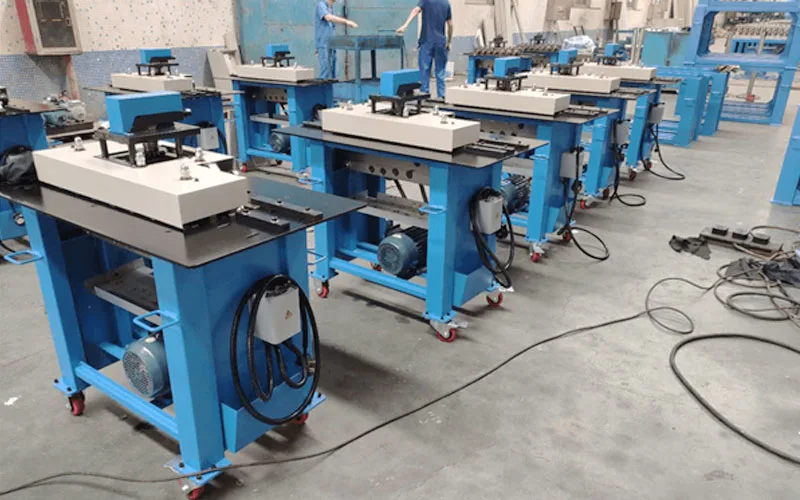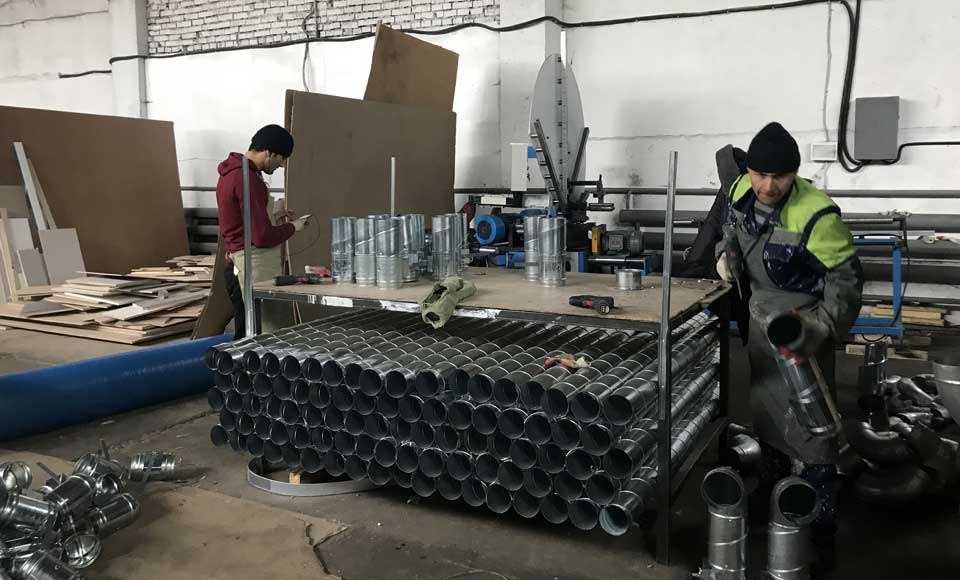
3 Methods of Sheet Metal Machine Processing
- By:Metmac
- 2023-09-27
- 479
In today’s society, the development of sheet metal industry is very rapid, and it can be said that no matter which industry is inseparable from it. So, how is sheet metal processing? The following is to introduce the basic knowledge of sheet metal processing.
I. Selection of materials. Gold processing materials generally used in cold-rolled sheet (SPCC), galvanised sheet (SECC), copper, aluminium, stainless steel plate, aluminium and so on. Its role is different. As for how to choose, generally need to be considered from its use and cost:
- Cold rolled sheet. Abbreviation SPCC, for surface treatment is electroplated colour zinc or baking paint parts.
- Galvanised sheet. SECC for short, for surface treatment is baked parts used in no special requirements, the general choice of SPCC, can reduce costs.
- Copper plate. Generally used for nickel-plated or chromium-plated parts, sometimes without treatment. According to the customer’s requirements.
- Aluminium plate. Generally used for surface treatment is chromate or oxidation parts.
- Stainless steel plate. Divided into mirror stainless steel and matte stainless steel, it does not need to do any treatment.
- Aluminium profile. Generally used for surface treatment is chromate or oxidised parts used mainly to support or connect the role of a large number of used in a variety of boxes.

II. Sheet metal processing process. For any sheet metal part, it has a certain process, which is also known as the process flow. With the differences in the structure of sheet metal parts, the process may be different, but the total does not exceed the following points:
- Design and draw its sheet metal parts of the parts drawing, also known as three views. Its role is to express the structure of its metal parts with drawings.
- Drawing the unfolding diagram. That is, a complex structure of the part is expanded into a flat piece.
- Unloading. There are many ways of discharging, mainly in the following ways:
A. Shearing machine, is the use of shearing machine cut out the width and length of the shape of the unfolding of the size, if there is punching, corner cutting, and then turn the punch combined with the mould punching, corner cutting and shaping.
B. Punching, is the use of punching in one or more steps in the plate will be unfolded after the parts of the flat structure punched into shape. The advantage is that it consumes short man-hours, high efficiency, can reduce processing costs, often used in mass production.
C. CNC numerical control material. First of all to write the CNC machining programme. Is the use of programming software, will draw the expansion of the map written into the NC numerical control machining machine can identify the programme, so that it follows these programmes step by step in a piece of iron plate, the structure of the flat parts of the shape of the punch out.
D. Laser cutting. The laser cutting method is used to cut out the structural shape of the flat piece on a piece of iron plate. - Flanging and tapping. Flap also called draw hole, that is, in a smaller base hole drawn into a slightly larger hole, and then tapped on the draw hole, which can increase its strength, to avoid slipping teeth. Generally used for thin plate thickness of the collar processing. When the plate thickness is large, such as 2.0, 2.5 and so on above the plate thickness, we can directly tapping, without flanging.
- Punch processing. General punching machine processing has punching and cutting, punching and dropping, punching convex package, punching and tearing, drawing holes and other processing methods to achieve the purpose of processing. Its processing needs to have the corresponding mould to complete the operation. Punching convex packet of convex packet mould, punching tearing of tear forming mould and so on.
- Pressure riveting. As far as the factory is concerned, often used in riveting studs, riveting nuts, riveting screws, etc., the riveting method is generally through the punch or hydraulic riveting machine to complete the operation, riveted to the gold pieces.
- Bending. Is a 2D flat piece, folded into a 3D part of its processing needs to have a bending machine and the corresponding bending mould to complete the operation. It also has a certain bending order, the principle is that the next knife does not interfere with the first fold, will produce interference after the fold.
- Welding. Is the group of multiple parts welded together to achieve the purpose of processing or a single part of the edge seam welding to increase its strength. Its processing side generally have the following kinds: CO2 gas shielded welding, arc welding, spot welding, robot welding, etc.. The choice of these welding methods is based on the actual requirements and materials. Generally speaking, CO2 gas shielded welding is used for iron plate type welding, chlorine arc welding is used for aluminium plate type welding, robot welding is mainly used when the material pieces are larger and the weld seam is longer, such as cabinet type welding can be used for robot welding, which can save a lot of man-hours and improve the working efficiency and welding quality.
- Surface treatment. Surface treatment generally have phosphate film, electroplating colour zinc, chromate, baking paint, oxidation and so on. Phosphate film is generally used for cold rolled plate and electrolytic plate, its role is mainly in the material on the surface of a protective film to prevent oxidation, and then is to enhance the adhesion of the baking paint. Electroplated colorful zinc is generally used for surface treatment of cold rolled plate, chromate, oxidation is generally used for surface treatment of aluminium plate and aluminium profiles, and the selection of its specific surface treatment is based on customer requirements.
- Assembly. The so-called assembly is a number of parts or components in accordance with a certain way to group together, so that it becomes a complete product. One of the things to pay attention to is the protection of the material, not to scratch. Assembly is the last step in the completion of a material, if the material is scratched and bruised and can not be used, need to rework and redo, will waste a lot of processing time, increase the cost of materials, so we must pay special attention to the protection of the material.

iii. Sheet metal working process. Sheet metal processing will often encounter some problems, you need to optimise its process, so that it becomes a good product or to achieve a specific purpose. The following is a brief introduction to our sheet metal processing, often to note that some of the process issues:
- Doors and panels. Generally the use of long edges wrapped around the short side of the processing mode, and then in the corresponding corners of the process of opening the hole, the size of the process of the hole is generally determined by the thickness of the plate, the thickness of the plate increases, the size of the process of the hole should be correspondingly increased, otherwise the bending will produce corners.
- Welded parts. Generally the use of jigs, holes or convex package to locate the welding. Can reduce the positioning of the wasted man-hours to ensure that the size, improve efficiency and reduce costs. In some of the more difficult to locate the welding, generally use the convex package or hole positioning.
- Electroplated parts. Because the plating solution has a corrosive effect on the material, so generally in the corners of the plated parts, increase the process of holes, to facilitate the plating solution discharged in a timely manner to ensure the quality.
- For a larger sheet metal parts, the material will be a certain amount of waste, we have to consider folding it into several sub-parts of separate processing, and then welded together, not only to ensure the quality, but also to reduce the waste of materials, cost savings.
The above are three is the basic knowledge of sheet metal processing, so we need to pay more attention to the processing in order to avoid the occurrence of problems, while trying to improve the quality of the product, to present customers with better quality products!
-

Iron Sheet Laser Cutting Machine: Unmatched Precision for Demanding Fabrication with METMAC
2026/01/06 -

Precision Metal Cutting Machine: The Engine of Modern Manufacturing, Powered by METMAC
2026/01/06 -

Sheet Metal CNC Laser Cutting Machine: Precision Redefined with METMAC Technology
2026/01/06 -

Sheet Metal Press Brake for Sale: Find Your Precision Bending Solution with METMAC
2026/01/06
-

Advanced Sheet Metal Rolling, Laser Cutting, and Folding Machines for Precision Fabrication
2025/10/31 -

High-Performance Sheet Metal Bending and Cutting Machines for Modern Fabrication
2025/10/31 -

High-Quality Sheet Metal Equipment for Sale: Efficient Solutions for Modern Manufacturing
2025/10/31 -

High-Performance Sheet Metal Equipment for Sale: Forming and Shearing Solutions for Modern Fabrication
2025/10/22
-
A Guide to the Latest Innovations in Sheet Metal Folding Machines
2024/11/29 -
Key Features to Consider When Investing in a Sheet Metal Folding Machine
2024/11/28 -
Enhancing Precision with Advanced Sheet Metal Folding Machines
2024/11/27 -
How to Choose the Right Sheet Metal Folding Machine for Your Workshop
2024/11/26

